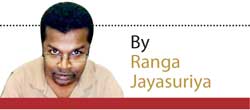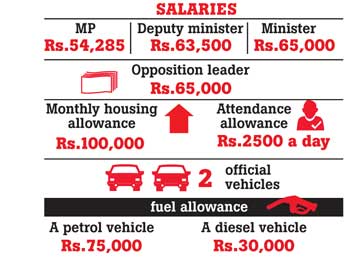Reply To:
Name - Reply Comment
Last Updated : 2024-05-11 03:39:00

The government has sought parliamentary approval for Rs.288 million to buy vehicles for several ministers, deputy ministers and state ministers. This comes in the wake of a previous supplementary estimate to the tune of Rs.791 million approved by Parliament last year to purchase vehicles for 25 parliamentarians.
Under perfect circumstances, especially in a country where average folks are forced to cough up nearly three times of the pre-duty value of even the cheapest car, the people ought to be outraged. However, in Sri Lanka where, an elaborate system of remunerations of its elected representatives has evolved over the decades, irrespective of public sentiments, the reaction is one of cynicism.
Though parliamentarians are no doubt entitled to certain privileges paid out from people’s tax money, first executive president J.R. Jayawardene took it to a new height, setting up an extensive network of patronage as means of buying the loyalty of his MPs. This system has since prevailed, no matter who ruled the country; in November, last year, this government approved Rs.100,000 a month as housing allowance for MPs and increased their attendance allowance from Rs.500 to Rs.2500 a day.
This does not mean that Sri Lankan parliamentarians are kleptocratic leaches. In an international comparison, or even compared to countries of similar per capita levels, their salaries are not that much. The salary of a Sri Lankan MP is Rs.54,285, a deputy minister Rs.63,500 and a minister and the opposition leader Rs.65,000. In addition, parliamentarians are entitled to Rs.100,000 as monthly housing allowance and Rs.2500 a day as attendance allowance. A minister is entitled to two official vehicles and a fuel allowance of Rs.75,000 for a petrol vehicle and Rs.30,000 for a diesel vehicle (if residing outside the Western Province) or a fuel allowance of Rs.50,000 for a petrol vehicle and Rs.20,000 for a diesel vehicle (if residing within the Western Province)

(In comparison, an Indian Lak Sabha MP draws a salary of Indian rupees 50,000 (approximately Rs.120,000), a constituency allowance of Indian Rs.45,000, an office allowance of Indian Rs.45,000 and Indian Rs.2,000 a day as attendance allowance)
With various other allowances and expenses to maintain a sizable staff, each minister, deputy minister and state minister in this country could well cost tax payers one million rupees a month.
Viewed in the context of the popular and well-founded argument that democracy itself is expensive and that MPs need to be remunerated well, such expenses could well be justified. One of the most famous advocates of that premise was Singapore’s former prime minister Lee Kuan Yew who argued: “Ministers who deal with billions of dollars cannot be paid low salaries without risking a system. Low salaries will not attract able men who are or can be successful in their professions or business. Low salaries will draw in the hypocrites who sweet talk their way into power in the name of public services, but once in charge will show their true colours and ruin the country.” Singapore’s prime minister is still the highest paid elected leader in the world.
The problem is actually not about how much ministers are paid, but rather whether the country derives a return from those expenses. That is where the comparison between Singapore (and some of the recent success stories of pro-growth authoritarian states) and many developing world profligacies end. Countries as diverse as Singapore, China, Vietnam and Rwanda have evolved systems where the ministers and public officials are assessed on their performance; such reviews decide not just their promotions, in some cases, their entire political existence. Singapore’s Cabinet is one of meritocracy. In China, better performing provincial officials are elevated to influential positions within the Communist Party, they rise through the provincial party committees to the national level. Same dynamism, though at a lesser degree, is in play in Vietnam. Rwanda is known for its efficient governance and sky high ambitions of Paul Kagame, its authoritarian president. None of the above is a democracy by most scales; nonetheless, the social economic transformation overseen by their political establishments dwarfs their democratic counterparts in all comparison. It was not the electoral pressure (there is hardly such a thing in those countries in the first place), but a very consequential pressure froma technocratic top leadership that compel the public officials to deliver. In democracies, such a compulsion or an oversight is nonexistent. Often in our system of horse trading to hold on to power, that degree of oversight could well result in a mass crossover by parliamentarians.
In Sri Lanka like any other democracy, the voters are the ultimate arbitrators of the electability of their political representatives. However, the performances of MPs and the ministers have hardly counted in the voter’s assessment. Traditionally, an MP who talks the most in television talk shows and news conferences is more likely to get re-elected than one who did the most productive work. Similarly, it is easier to get elected by protesting against things, than doing something useful.
The consequences of this status quo are manifest in overall inaction in our system.
Take for instance our education and higher education systems which has lagged well behind that of its international peers. No subject minister in the past and current has genuinely tried to fix the mess. On the contrary, students of Vietnam, a country of 90 million with a per capita income a little more than Tamil Nadu, score ahead of their peers in developed Germany in international PISA tests.
Also since parliamentarians are insulated from daily hazards, the average folks face -- unlike the elected representatives of advanced democracies, who travel in public transport -- there are not many incentives to provide solutions to difficult problems. Take for instance, our crumbling public transport sector, which still rely on ramshackle buses and shouting conductors. That is a system that lags one full generation behind from even many developing states.
It took the Megapolis Minister to introduce a separate bus lane, not a rocket science solution, but, why a long list of predecessors were not bothered was that it did not count in their political fortunes. Same applies to many others who were just riding the gravy train for generations and had delivered very little to the people.
During the past seven decades, in the whole of developing part of Asia, only a handful of leaders won the highest political office through a free and fair election (not one in which the election system is staked in favour of the ruling party as in most pro-growth authoritarian systems) by virtue of their economic performance. Narendra Modi may be the best known among those few technocrats, who may also include Indonesia’s current president, who was the former mayor of Jakarta. On the contrary, our region has a disproportionate share of widows and feudal scions who reached the highest positions of political power thanks to the linage, and nothing else.
The root of problem in those political systems lies at the premature political empowerment, which distorted political and economic trajectories of those states. Where political empowerment overlooked the requisite economic and social empowerment, political, economic and social progress stagnated at one point.
By lowering the bar for political participation, they, over time created rather paradoxically, apolitical culture that kept away accomplished and competent individuals. Political mobilization in those countries is often primitive and politicians are microscopic of the regressive mass base. Without fixing those internal dysfunctions, those societies would neither become liberal democracies, nor economic success stories.
Irrespective of those defects, consolation in a democratic system is that it let the voters to kick out their governments in elections, when they fail to deliver. However, that alone would mean very little, if its successors proved to be as equally incompetent as the predecessors.That is what most developing world democracies, including our own, are at present.
Pro-growth authoritarian models could well be culture specific. But, efficient government model are not. The government should have a system to asses its members of Parliament basedon their performance. Perhaps, then the public would take heed of. Otherwise, all these expenses on the MPs, spent for the sake of democracy,may do very little to sustain democracy in the long run.
Follow RangaJayasuriya @RangaJayasuriya on Twitter
Upali Tuesday, 28 March 2017 03:16 PM
Very well written analitical expalanation of our sad state of 'democracy'. Please translate into Sinhala and publish in Lankadeepa. The masses should (at least) try to visualise our future in this line of thinking.
Buddhadasa Wednesday, 29 March 2017 11:19 PM
It is true at the elections, the public get deceived. However, when the politicians start creaming off public money, the public also has a responsibility. They should cast away their political favouritisms and flock together for the benefit of the country. People should not allow any politician whoi has done any corrupt deals to get away. Leave him . Dont vote him again. People should try to evict them as the South Koreans did to their corrupt president.
Premalal Thursday, 30 March 2017 11:32 AM
Democracy? What democracy. ? We always have governments of crooks, governed by crooks for crooks. Democracy in SriLanka ended on the 4th of February 1948.

Add comment
Comments will be edited (grammar, spelling and slang) and authorized at the discretion of Daily Mirror online. The website also has the right not to publish selected comments.
Reply To:
Name - Reply Comment
US authorities are currently reviewing the manifest of every cargo aboard MV
On March 26, a couple arriving from Thailand was arrested with 88 live animal
According to villagers from Naula-Moragolla out of 105 families 80 can afford
Is the situation in Sri Lanka so grim that locals harbour hope that they coul